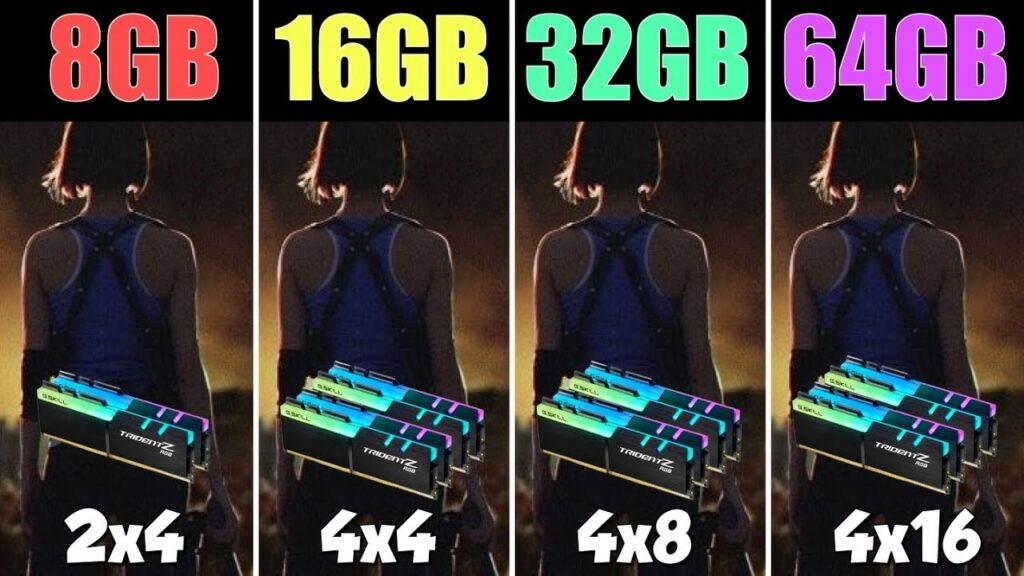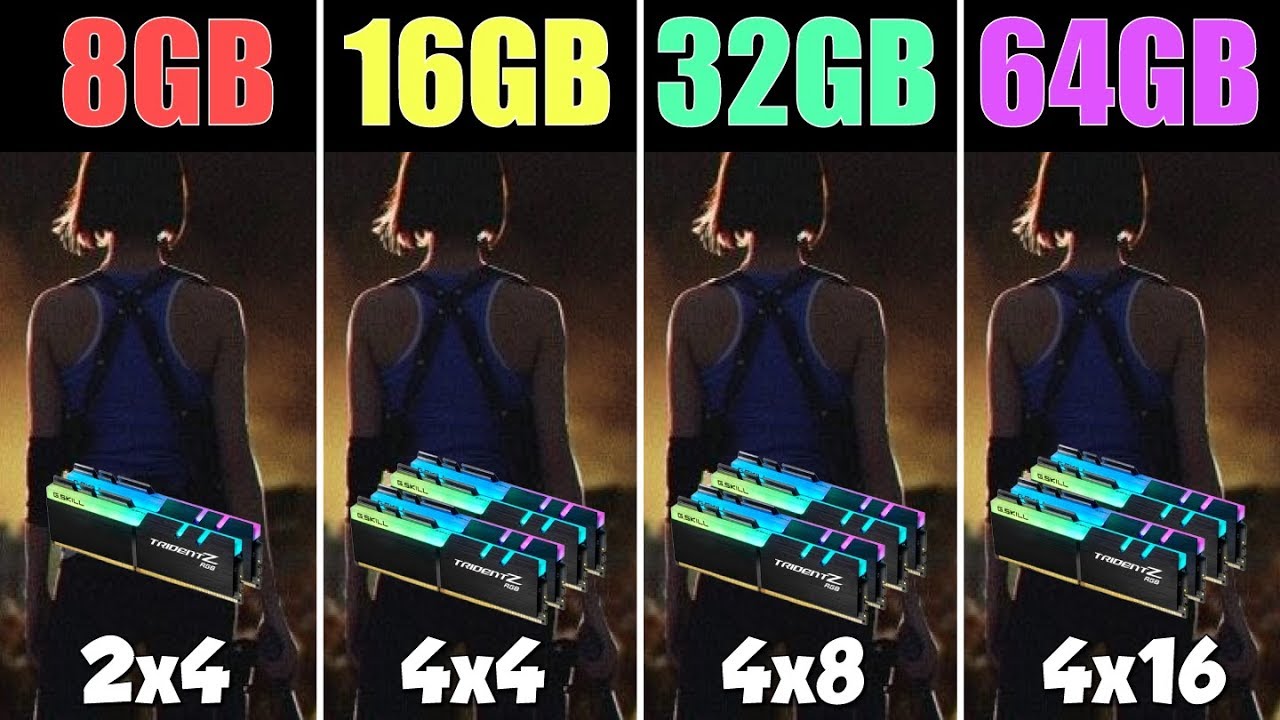So you’ve finally decided to upgrade your computer, and while shopping for components, you find yourself faced with the question: is 64 GB RAM overkill? With technology constantly evolving, it’s important to stay up to date, but it’s equally important not to waste your hard-earned money on unnecessary upgrades. In this article, we will explore the pros and cons of investing in such a massive amount of RAM, helping you make an informed decision about whether 64 GB RAM is truly necessary for your computing needs.

This image is property of www.cgdirector.com.
What is RAM?
RAM, which stands for Random Access Memory, is an essential component of a computer system. It is a form of volatile memory that allows your computer to store and quickly access data that it needs to run programs and perform various tasks. Essentially, RAM serves as a temporary workspace for the computer to manipulate and store data while it is actively being used.
Definition of RAM
RAM is a type of computer memory that provides temporary storage for data that is actively being processed by the CPU. Unlike permanent storage devices such as hard drives or solid-state drives (SSDs), RAM is volatile, meaning that its contents are lost when the computer is powered off or restarted. RAM is essential for the smooth operation of programs and is directly responsible for the overall speed and performance of your computer.
How RAM works
When you open an application or program on your computer, it is loaded into RAM. This allows the CPU to quickly access and retrieve the necessary data for running the program. The more RAM you have, the more applications and programs your computer can keep open and readily accessible without causing a significant slowdown in performance. When RAM becomes full, the computer starts using a portion of the hard drive or SSD as virtual memory, which can significantly slow down operations.
Importance of RAM in a computer
RAM plays a crucial role in determining the performance and responsiveness of your computer. Insufficient RAM can lead to slow loading times, laggy performance, and frequent crashes, especially when running resource-intensive applications or multitasking. Adequate RAM allows your computer to juggle multiple programs seamlessly, ensuring smooth multitasking, faster data processing, and a more enjoyable computing experience overall.
How much RAM do you need?
Determining how much RAM you need depends on various factors, including your specific use case, budget, and the software you intend to run on your computer. While it’s always a good idea to have more RAM if you can afford it, you don’t necessarily need an excessive amount that goes beyond your requirements.
Determining factors for RAM requirements
There are a few key factors to consider when determining your RAM requirements:
-
Operating System: Different operating systems have varying RAM requirements. For example, Windows 10 recommends a minimum of 4 GB of RAM for 64-bit systems, while macOS requires a minimum of 4 GB of RAM for basic functionality.
-
Type of Applications: Consider the type of applications you use or plan to use. Resource-intensive applications like video editing software, virtual machines, and 3D rendering programs typically require more RAM to run smoothly.
-
Multitasking: If you tend to have multiple applications open simultaneously or frequently switch between tasks, more RAM will allow for smoother multitasking without a noticeable decrease in performance.
-
Future-proofing: Anticipating the future needs of your computer is essential. As technology advances and software becomes more demanding, having a higher amount of RAM can help future-proof your system and ensure longevity.
Minimum RAM requirements for different uses
The minimum RAM requirements can vary depending on the purpose of your computer usage:
-
Basic tasks: For everyday tasks like web browsing, word processing, and email, 4 GB to 8 GB of RAM should suffice. However, having 8 GB or more is recommended for a smoother experience, especially if you tend to have multiple applications open simultaneously.
-
Gaming: Gaming can be RAM-intensive, especially for modern AAA titles. While 8 GB is the minimum requirement for most games, aiming for 16 GB or more will ensure optimal performance in demanding gaming scenarios.
-
Creative professionals: Professionals working with graphic design, video editing, or 3D modeling software typically require a higher amount of RAM. 16 GB to 32 GB is often recommended, but for more complex projects, such as rendering large video files, 64 GB can greatly enhance performance.
-
Servers and data-intensive tasks: Servers and heavy data processing tasks, such as running virtual machines or analyzing large datasets, can benefit from higher RAM capacities. In these cases, 64 GB or even more may be necessary to ensure smooth operation.
Ideal RAM sizes for different scenarios
While the ideal RAM size will vary depending on your specific needs, here are some general recommendations:
-
Entry-level usage: For basic tasks and light multitasking, 8 GB to 16 GB is generally sufficient.
-
Gaming and general usage: For gaming and general usage with moderate multitasking, 16 GB to 32 GB is recommended.
-
Creative work: For graphic design, video editing, or other creative work, 32 GB to 64 GB will provide the necessary headroom for resource-intensive applications.
-
Servers and data-intensive tasks: For server usage or heavy data processing, 64 GB or more may be required, depending on the specific requirements of your tasks.

This image is property of i.redd.it.
Advantages of 64 GB RAM
While 64 GB of RAM may seem excessive for most users, there are several advantages to having this amount of memory in your computer.
Smooth multitasking
One of the primary advantages of 64 GB RAM is its ability to handle intensive multitasking without any noticeable slowdowns. If you frequently have numerous applications running simultaneously or need to switch between resource-intensive tasks quickly, 64 GB of RAM can ensure a seamless and uninterrupted experience.
Faster data processing
Having a large amount of RAM allows your computer to store and access more data simultaneously, resulting in faster data processing. When your computer can keep more data in RAM instead of relying on virtual memory or accessing data from slower storage devices like hard drives, processes can be completed more rapidly, resulting in a significant boost in overall performance.
Efficient virtualization
Virtualization, the process of running multiple operating systems or instances on a single physical machine, requires a considerable amount of RAM. If you regularly work with virtual machines or run resource-intensive software in a virtualized environment, 64 GB of RAM can provide the necessary headroom to maximize efficiency and ensure smooth operation.
Future-proofing
Investing in 64 GB of RAM can be seen as a form of future-proofing your computer. As technology evolves and software becomes more demanding, having a higher amount of RAM can ensure that your computer remains capable and responsive for years to come. Additionally, it allows you to handle upcoming advancements in software or technology without the need for immediate upgrades.
Disadvantages of 64 GB RAM
While there are advantages to having 64 GB of RAM, there are also some considerations and potential disadvantages to take into account.
Cost
The most significant disadvantage of opting for 64 GB of RAM is the cost. Higher RAM capacities come with a heftier price tag, making it a substantial investment compared to lower capacity options. If you’re on a tight budget or don’t require the additional RAM for your specific needs, it may not be a justifiable expense.
Limited impact on everyday tasks
For everyday tasks like web browsing, word processing, or casual gaming, 64 GB of RAM will likely have limited impact compared to lower capacity options. Most basic tasks can be comfortably handled with less RAM, so investing in 64 GB may not be necessary unless your usage specifically requires it.
Compatibility issues
Upgrading to 64 GB of RAM may pose compatibility issues, depending on your computer’s motherboard and CPU. It’s essential to ensure that your system supports higher RAM capacities and that the modules you purchase are compatible with your existing hardware. Lack of compatibility can render the additional RAM unusable or result in unstable system performance.
Diminishing returns
There is a point of diminishing returns with RAM capacity. While having more RAM can enhance performance, the improvements become less noticeable as you exceed the requirements of your specific tasks. Unless your usage is highly demanding or involves specialized applications, the benefits of 64 GB of RAM may not be substantial enough to justify the investment.

This image is property of i.ytimg.com.
Common RAM requirements
To understand the RAM requirements better, let’s take a look at some typical scenarios and their corresponding RAM needs.
Average RAM usage for basic tasks
For everyday tasks like web browsing, email, and basic document editing, the average RAM usage is typically between 2 GB and 4 GB. However, having a higher amount of RAM, such as 8 GB or more, can provide a smoother experience and support multitasking without any noticeable slowdowns.
RAM requirements for gaming
Gaming RAM requirements vary depending on the specific game and its demands. While modern games often specify a minimum of 8 GB of RAM, aiming for at least 16 GB can ensure optimal performance and prevent any potential slowdowns that can occur during gameplay.
RAM needs for creative professionals
Creative professionals who work with graphic design software, video editing applications, or 3D modeling programs typically require more RAM to handle the resource-intensive nature of these applications. For tasks like video editing or working with large files, having 16 GB to 32 GB of RAM is often recommended. However, for professionals working with extremely large files or complex projects, 64 GB or even more may be necessary.
RAM demands for server and data-intensive tasks
Servers and data-intensive tasks, such as running virtual machines, databases, or scientific simulations, can greatly benefit from higher RAM capacities. Depending on the specific requirements of your tasks, 64 GB or more may be necessary to ensure smooth operation and prevent any bottlenecks caused by insufficient memory.
Factors to consider before opting for 64 GB RAM
Before deciding to opt for 64 GB of RAM, there are several important factors to consider that can help you determine if it is the right choice for your specific needs.
Budget
The cost of upgrading to 64 GB of RAM is significantly higher compared to lower capacity options. Assessing your budget and considering the overall value you will gain from the additional RAM is crucial. If the higher cost outweighs the benefits you will experience in your day-to-day tasks, it may be more reasonable to consider a lower capacity option.
Type of tasks performed
Understanding the specific tasks you perform on your computer is vital in determining your RAM requirements. If you primarily use your computer for basic tasks like web browsing, email, and document editing, having 64 GB of RAM may be excessive and unnecessary. However, if you work with resource-intensive software or engage in activities like video editing, rendering large files, or running virtual machines, 64 GB may be a suitable investment.
Future upgrade possibilities
Consider your future needs and whether investing in 64 GB of RAM aligns with your long-term plans. If you anticipate working with more demanding software or require additional memory for planned upgrades, opting for 64 GB can provide the necessary headroom and ensure the longevity of your system without the need for further upgrades in the near future.
Compatibility with existing hardware
Before upgrading to 64 GB of RAM, it’s essential to ensure compatibility with your existing hardware. Check your computer’s motherboard and CPU specifications to ensure they support higher RAM capacities. Additionally, verify that the RAM modules you intend to purchase are compatible with your system to avoid any compatibility issues or instability.

This image is property of www.cgdirector.com.
Alternatives to 64 GB RAM
If 64 GB of RAM doesn’t align with your needs or budget, there are several alternative options to consider based on your specific requirements.
32 GB RAM
If you work with resource-intensive applications or engage in moderate multitasking, 32 GB of RAM can provide a substantial performance boost without the high cost associated with 64 GB. It strikes a balance between cost and performance for most professional tasks and demanding software.
16 GB RAM
For gaming, general usage, and light multitasking, 16 GB of RAM is often more than sufficient. It provides a comfortable amount of memory for running most applications smoothly while remaining relatively budget-friendly.
8 GB RAM
For basic tasks and casual computer usage, 8 GB of RAM is generally adequate. It can handle everyday activities like web browsing, streaming media, and word processing without significant slowdowns. However, if you tend to have multiple programs open simultaneously or engage in more demanding tasks, upgrading to 16 GB is recommended.
Optimizing RAM usage
If your current RAM capacity is limited, optimizing your RAM usage can help improve performance without the need for a RAM upgrade. Close unnecessary background programs, reduce the number of browser tabs or extensions running simultaneously, and prioritize active applications to ensure they receive the necessary resources.
Real-world examples
To get a better understanding of how 64 GB of RAM can impact different scenarios, let’s explore some real-world examples.
Case study 1: Gaming with 64 GB RAM
In the gaming realm, having 64 GB of RAM may be unnecessary for the majority of games. Most modern games specify a minimum requirement of 8 GB, and many run smoothly with 16 GB or 32 GB. However, for gamers who engage in streaming, content creation, or running resource-intensive mods or server instances, 64 GB can provide a significant performance advantage. It allows for a seamless gameplay experience while simultaneously handling tasks like streaming, video capture, and content creation without any noticeable slowdowns or frame drops.
Case study 2: Video editing with 64 GB RAM
Video editing software is notorious for its resource-intensive requirements. When working with large video files, complex effects, and multiple tracks, having ample RAM is crucial to maintain smooth playback and efficient editing. With 64 GB of RAM, video editing professionals can benefit from significantly faster rendering times, smoother timeline scrubbing, and improved overall productivity. The large RAM capacity allows for seamless handling of large media files and ensures that the editing software has sufficient space to cache and process data quickly.
Case study 3: Server performance with 64 GB RAM
Servers hosting websites, databases, or virtual machines require sufficient resources to handle multiple concurrent connections and data requests. Having 64 GB of RAM in a server environment provides the necessary headroom to handle spikes in traffic and resource demands. It ensures smooth operation, prevents bottlenecks, and allows for efficient scaling of resources. For example, a virtualized environment running multiple instances can benefit from 64 GB of RAM by allocating sufficient memory to each virtual machine without sacrificing performance or responsiveness.

This image is property of i.ytimg.com.
Expert opinions
There are varying opinions among tech experts when it comes to the necessity of 64 GB of RAM. Let’s explore some arguments from both sides.
Tech experts advocating for 64 GB RAM
Some tech experts argue that 64 GB of RAM is essential for future-proofing your computer and maximizing performance, especially for professionals working with resource-intensive software. They believe that having ample RAM enables smoother multitasking, faster data processing, and the ability to handle upcoming advancements in technology without the need for immediate upgrades.
Tech experts advising against 64 GB RAM
On the other hand, some tech experts argue that 64 GB of RAM is overkill for the majority of users. They believe that, for most tasks and applications, lower capacity options like 16 GB or 32 GB provide more than enough memory. According to them, investing in 64 GB of RAM may not result in significant performance improvements for everyday users and may be an unnecessary expense.
Conclusion
Determining the right amount of RAM for your computer ultimately depends on your specific needs, budget, and the tasks you perform. While 64 GB of RAM offers advantages such as smooth multitasking, faster data processing, and future-proofing, it may not be necessary or justifiable for all users. It is essential to consider factors such as your budget, the type of tasks you perform, potential future upgrades, and compatibility with your existing hardware. By balancing performance, cost, and future-proofing considerations, you can make an informed decision about your RAM requirements and choose the appropriate capacity that meets your needs. Remember, more RAM is not always better; it’s about finding the sweet spot that optimizes performance and meets your specific usage demands.
